 It’s been an amazing run for Amazon these past few years. This is a company that has redefined the way we read, the way we shop, and in the last few years, the way we interface with devices.
It’s been an amazing run for Amazon these past few years. This is a company that has redefined the way we read, the way we shop, and in the last few years, the way we interface with devices.
While the Kindle and e-commerce have changed our lives, perhaps its “Alexa” – or the Amazon Echo – that has rocked our worlds. How pervasive has this device become in our lives? The technology is now being “baked” into myriad devices, including dashboards, appliances, and other applications we cannot even imagine. And “Alexa” – a beautiful name for a baby girl – has now fallen below Gertrude, Beulah, and Shirley because of Amazon’s fast-growing brand of smart speaker.
Well, almost.
In the world of media and technology, the Amazon Echo and its related line of products, has about a 75:25 lead in the U.S. over the Google Home, while the “failing” Apple HomePod has failed to make much of an impact. We’ve tracked Amazon’s hare/tortoise like-lead over Google in the smart speaker sweepstakes in all three of our Techsurveys this year – for commercial radio, public radio, and Christian music radio – and the results consistently reflect Alexa’s huge lead over its would-be competitors.
But now, new data from Strategy Analytics – reflecting worldwide sales – suggest Amazon’s advantage may be short-lived. Google has made rapid gains in 2018, while Apple’s HomePod entry may not be as pathetic as many observers think.

Yet, when I present the results of our Techsurveys to broadcasters and other interested audiences, suggesting that Amazon may not dominate smart speakers forever, most scoff at the notion that Alexa could somehow lose its massive lead to Google – or anyone else.
And yet, Blackberry once dominated the smartphone race (along with Nokia).
MySpace was the category killer in social media.
And Yahoo! (along with Lycos, Netscape, and others) were the big early leaders in search.
Today, all three categories are dominated by other brands, while many of these former juggernauts are out of business or are close. Whe n think of smartphones, social media, and search, Apple, Facebook, and Google have long been the names that now first come to mind.
In these days when tech companies continue to dominate the landscape, the unlikely can become likely. New brands, innovative products, and aggressive marketing campaigns can turn the competitive tides – quickly.
According to Slate‘s Will Oremus, Google points to a number of factors to explain their comeback – better search, support from brick-and-mortar stores, and an aggressive marketing campaign.
We saw the latter vividly at CES this year – one of our big takeaways from this year’s conference. In an all-out street war, Google creamed Amazon every way you looked at it.
In a fight reminiscent of radio wars like Z100 vs. WPLJ, Power Pig vs. Q105, and WRIF vs. WLLZ here in Detroit, the street played an oversized role in the ways these battles played out. Yes, well-researched music, entertaining morning shows, and clever contests all played a role in the ways in which these wars were fought and won. But tactically, the stations that came out on top often triumphed with a superior street presence.
At CES, Google employed seemingly hundreds of street teamers, dressed in highly visible jumpsuits to dominate a huge convention footprint. They had massive signage in most casino hotels, they wrapped the monorail, and they were everywhere.
Their actual exhibit was bigger than life: two highly visible buildings – one that featured an impressive showroom of connected gadgetry, and a case that offered juice drinks and Starbucks. When the wait time neared the 60 minute mark, these helpful young reps were on hand with free pizzas and tequila shots to keep conventioneers happy.
Google even offered guided meditation sessions on a patio atop the cafe throughout the day (OK, so not everything was on-message – it’s hard to relax at CES).
Amazon, on the other hand, featured an Airstream trailer tethered to the parking lot in front of the north and central halls.

An edge in tech (like a better signal in radio) and a head start (station heritage) are often key advantages in winning the radio wars. But an aggressive, all-out street war is still an effective tactical strategy – even in these times when Big Data and Artificial Intelligence are buzzwords.
None of us knows how the “Battle of the Smart Speakers” will play out over the next few years. But I can bet you that at CES this January, Amazon will come armed with more than a trailer in the parking lot.
As Labor Day approaches, we’re entering the zenith of a highly contested political battlefield that will come to a head in early November. Pay attention to more than just whether radio billings increase over the next two months. Check out how candidates approach and strategize the street fights, the logo wars, and the other knife fights that will undoubtedly take place as the “Red Empire” fights valiantly to stave off the “Blue Wave.”
At a time when radio companies are challenged about how to best deploy dwindling financial and human resources, operators would be wise not to ignore the local environs: street fairs, high school football games, charity walks and runs, and yes, even bar nights.
As both Amazon, Google, and Apple well know, superior technology is a plus, but it won’t necessarily win the war.
This is an image game, a street fight, a war for top-of-mind awareness.
Right up radio’s alley.
- Radio’s Dilemma: Trump Or Get Trumped - March 13, 2025
- What About Bob? - March 12, 2025
- Inside “3 Minutes” – An Exclusive Interview With Nielsen’s Rich Tunkel - March 11, 2025




Radio Frequency Wins! Thanks again, Fred.
Many thanks, Clark.
I’ve always believed in the winning the streets strategy. You have to touch people where they are to win their hearts.
True that. No matter how far we move technologically, that hi-touch quality will always have value. Thanks for the comment.